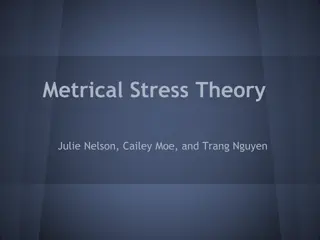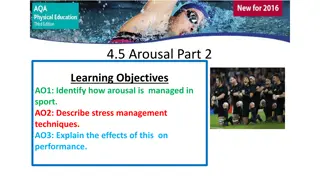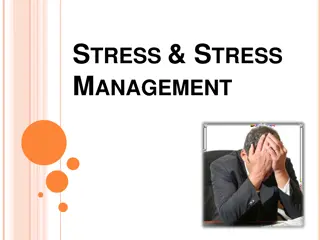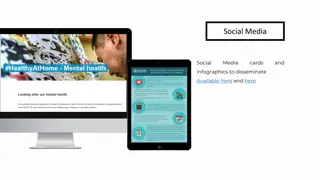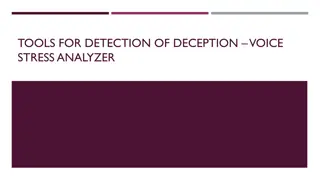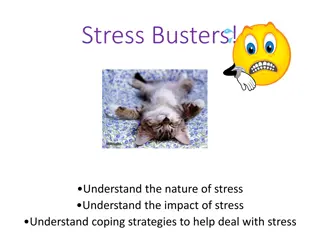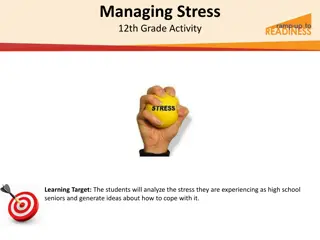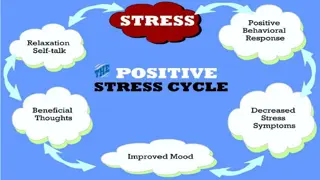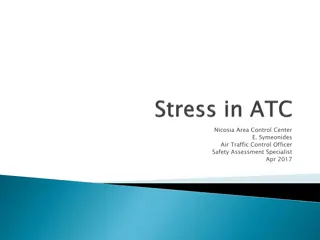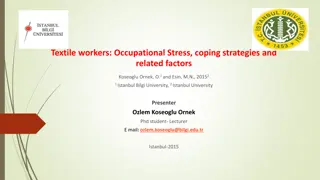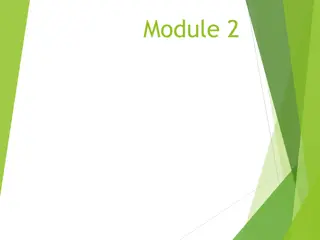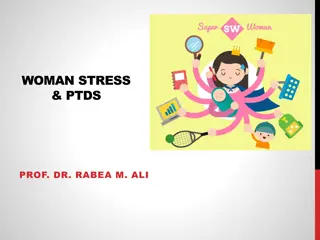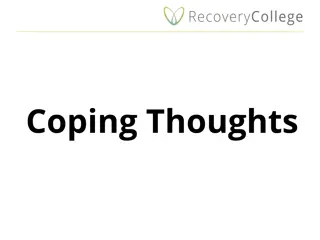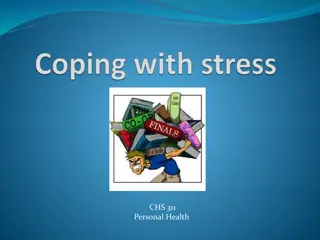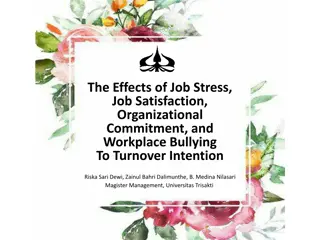Understanding Organizational Stress: Impact on Performance and Coping Strategies
Stress in organizations is a state of imbalance between demands and capabilities, affecting individuals' emotional, cognitive, and physiological responses. Stress can be constructive or destructive, impacting job performance. Stress vulnerability is influenced by perceived control and autonomy levels. Various causes of stress exist, but management tools, such as workload management and work-life balance, can help prevent and cope with organizational stress.
Download Presentation

Please find below an Image/Link to download the presentation.
The content on the website is provided AS IS for your information and personal use only. It may not be sold, licensed, or shared on other websites without obtaining consent from the author. Download presentation by click this link. If you encounter any issues during the download, it is possible that the publisher has removed the file from their server.
E N D
Presentation Transcript
FROM SHAIKH KAUSAR CLASS : FYBMS SUB : FOUNDATION OF HUMAN SKILLS UNIT 4 Organizational stress
Definition :- Stress may be defined as a state of psychological and or physiological imbalance resulting from the disparity between situational individual s ability and meet those demands. demand or motivation to and the
DEFINITION OF ORGANIZATIONAL STRESS Organizational commonly emotional, cognitive behavioural and physiological response to the aggressive and harmful aspects of work, work and organizational climate. stress is defined as an environment
THE NATURE OF STRESS Stress and Job Performance: Stress can be constructive or destructive: As stress increases performance also improves as the individual gathers resources to meet the new requirement . Thus stress is constructive in nature. Too much stress leads to tension , anxiety and low performance. The person is unable to make decisions . And if the stress level increases the performance becomes zero. There Stress becomes destructive in nature when the level of stress becomes excessive.
STRESS VULNERABILITY Stress threshold: level of stress that the person can tolerate before negative feelings about stress occurs and has an adverse effect on performance. stress threshold is the Perceived control thinks is the way one feels ,Employees who have independence , autonomy and freedom to make decisions in their work place are able to handle stress better. How a person perceives at the situation and what he thinks about it will determine whether an individual will experience stress or not. : The way one
STRESS TOOLS Management Standards Providing Guidance on How to Prevent Work-related Stressors Workload Job Insecurity Team working Performance feedback Training & development Hours of work Job design Management support Tools and equipment Communication Work-life balance Effort-reward imbalance
AN ORGANIZATIONAL APPROACH TO MANAGING WORKPLACE STRESS Being Proactive: An Organizational Approach to Managing Workplace Stress Creating a healthy and safe workplace requires employers and employees to work systematically together to identify hazards and manage them Stress an integral and inevitable feature of most contemporary workplaces Workplace perceive an imbalance between the pressures and demands made on them and the resources they have to cope . stress arises when individuals
MANAGING STRESS IN THE WORKPLACE Traditional view Stress the responsibility of the individual Organizational view Employers and employees have a responsibility to address work-related stress
STRESS MANAGEMENT It is the amelioration of stress and especially chronic stress often for the purpose of improving everyday functioning. Stress produces numerous symptoms which vary according to persons, severity. These can include decline as well as depression situations, physical and health
CAUSES OF STRESS MANAGEMENT Whenever favorable, then it tries to defend itself. If this situation continues for a long time, then our body is working overtime. our body feels something not There are several causes of stress. For example, you are under stress when you are worried about something, worried about your children, worried about the illness of your father, worried about your job security, or worried about your loans or similar things.
CAUSES OF WORK STRESS To meet out the demands of the job. Your relationship with colleagues. To control staff under you. To train your staff and take work from them. Support you receive from your boss, colleagues and juniors. Excessive work pressure. To meet out deadlines. To give new results. To produce new publications if you are in research area. Working overtime and on holidays
OTHER CAUSES OF STRESS Fear, intermittent or continuous. Threats: physical threats, social threats, financial threat, other threats. Uncertainty. Lack of sleep. Somebody misunderstands you. Setback to your position in society
STRESS MANAGEMENT AT WORK PLACE There is no doubt that stress is one on of the leading factors absenteeism among employees. Besides lowering a person's immune response, stress makes us want to avoid whatever is causing it. If there is stress at work, workers who feel mildly off will feel even worse and resist coming to work. This costs many hours of productivity, lost on stress-caused illnesses and absenteeism. in illness and
A management through workplace wellness programs not only helps their employees to handle pressure better and stay healthier during times of stress, it also sends a message that their company cares about them. This provides emotional support as well as physical support for fighting the effects of stress workplace that supports stress
BUSINESSADVANTAGESOFSTRESS MANAGEMENT: B L related illness or accidents a Improved job performance Less absenteeism due to stress-related disorders Less worker's compensation loss due to stress- L Less stressful, more efficient workplace I Improved employee attitude I Improved employee overall health
DISADVANTAGESOFSTRESS Stress can be a motivator. For example, if you re stressed out because you have a big assignment due, this may motivate you to work on it and complete it. The stress can help you to put in your very best effort. If you're afraid of losing your job, stress may encourage you to raise your own standards and make improvements you most likely would not have made without unemployment. the threat of
While we all experience stress frequently in our daily lives, not everyone handles it in positive ways. The key for us all is to learn what strategies and behaviors help us to cope with stress in a positive manner. Stress is a disadvantage because it can potentially raise your heart rate and weaken your immune system. Also, it can be a factor in poor decision making because under stress we may not think logically or consider the consequences of the choices we make.
FROM : KAUSARSHAIKH Thank you


